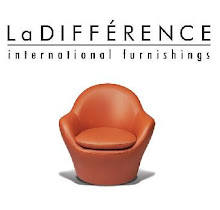Our friend's remark: "I have never known anyone who called their furniture by name before. How... interesting."
See, because we sell it and work with it every day, it had an identity to us, beyond 'bookcase' or 'loveseat' or 'dining table.' So... we used those words because we KNEW them.
This memory came back to me this week as I read the following tweet from @TheArtOfRetail:
How Knowledge Can Hurt Innovation. Great article by Scott Anthony, with the URL attached. You can read the article here too, from the harvardbusiness.org website.
The article made me think about the 'language' that exists in various businesses: where shortcuts, nicknames, and initials take over from the 'plain English' most of us might use.
For over 18 years, I've been in the 'furniture business' and I've come to know 'furniture speak' as if it were the French I learned from kindergarten through high school or the ancient Greek I learned in college. Okay, I actually know 'furniture speak' better than either of those, because I'm considerably more confident in my furniture fluency. Sadly, while I do remember my Greek alphabet, the only Greek sentence I can still write is "ο άνθρωπος εςti καλός", loosely translated as 'man is good' - and I probably got the accents wrong just now.
In any event, for me, the gist of Mr. Anthony's article is that businesses and professionals get so caught up in what they know and have always known that they forget that others do not possess the same knowledge or experience. It can affect relationships with new hires from other industries on one level, but, more importantly, it can affect relationships with their clients and customers, on whom their livelihood depends.
Let me break it down.
Did you know that furniture store salespeople occasionally laugh when customers say they are looking for a 'couch'? Yes, it's true. In furniture speak, we don't use the word couch. We use sofa. And a sofa is different from a loveseat, or a sectional, or a sleeper sofa, or a modular, etc., etc.
Why don't we use 'couch'? I haven't the foggiest idea. Someone, somewhere along the line, in the world of upholstery manufacturers decided that the proper term for a piece of furniture that seats 3 people across would be a SOFA. Go figure. Problem is... they never figured out a way (successfully!) to tell the people who BUY them (the consumer). So, day in and day out, we have visitors who tell us they're looking for a couch. And without overtly correcting them, we try to determine what they mean by that word.
Same thing applies with bedroom storage furniture. Here are just a few words used by our customers: chest, dresser, highboy, chifferobe, man's chest, mule chest, lingerie dresser, sweater chest, armoire, wardrobe. Whew! They want SOMETHING with drawers. They might not know the 'real' word for it... so it's OUR JOB to figure that out, with them.
Consumers don't often know how our business works either. The idea of waiting for furniture to be built or upholstered just for them is an education process that works well when the customer understands 'custom made furniture'. Too often, customers seem to think there is this huge warehouse somewhere, and sitting on a shelf in that warehouse is the 6-piece coral leather sectional that they want... for delivery tomorrow. It just doesn't work that way...
It falls on us, as the presumed furniture 'experts' to have the answers, the explanations, and the vocabulary ready that our clients will understand. For instance, furniture coming from Europe is not flown here, but has to travel by boat, in a large box (a 'container'). There are lots of things that can delay that arrival too: hurricane warnings force boats back to sea; dock strikes prevent boats from arriving because there is no one to greet them. We've even had containers rerouted because of stow-aways found on board! Once in the States, the container has to clear US customs and pass inspections with the FDA, TSA and any other 'acronym' Homeland Security wants to have involved - and any one of them can hold up the process with a search at any time. The 'box' (aka the container) is then trucked from the port to our store - finally.
Most people shopping for furniture don't know all of this. It's not their 'job' to know. It is our job to try to explain the process so that the experience of 'shopping for furniture' (at our store at least) makes a bit more sense.
So, while we may still call our furniture by name at home, we are quite aware that most people think of their table as a table, and only in dire need of instruction even consider if they meant the coffee table versus the dining table.
Mr. Anthony's advice is well-timed in an era where relationship-building is critical and consumer-confidence is - hopefully - on an upward slope again. Consumers do business with PEOPLE they trust; when you translate the language you use, you build trust. Anthony offers sound advice against the ill-used concept of assumption... because, after all... when we 'assume' that someone knows what we know, we make an ASS out of U and ME. And we don't want to do that now, do we?

This is the best article I have read in some time. It just makes since!!!!! You woke me up.
ReplyDeleteI hope you don't mind if I share this with my colleague's.
Gilbert La Rowe
Delos Rugs
I agree with Mr. La Rowe. Great article and I will share as well. Nice work!
ReplyDeleteI have felt this way for a long time. I am constantly struggling to find a way to explain my industry in a language "my Mom would understand." Thanks for a great article.
ReplyDelete